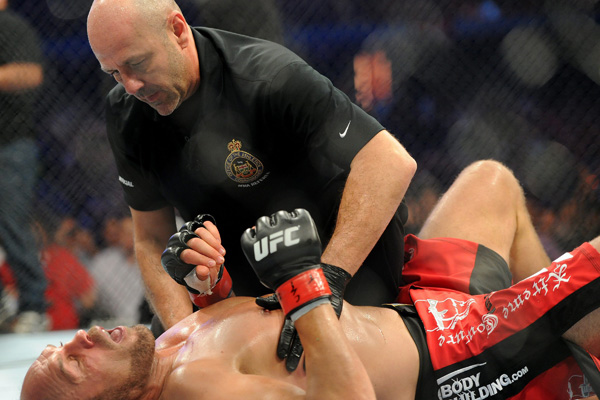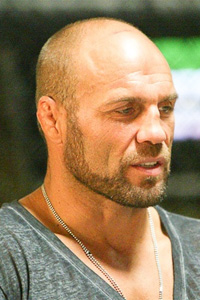Sherdog.com’s 2011 Knockout of the Year

Lyoto Machida’s front kick was equal parts beautiful and brutal.
| The Canadian Press, Nathan Denette
Insomuch as the sight of one man concussing another can be considered beautiful, what Lyoto Machida did in Toronto on April 30 was exactly that.
One graceful, devastating blow did the deed, a single strike as visually arresting as it was meaningful for the fighters on either end. In a blink, “The Dragon” breathed new life into his own career and kicked closed the cage door on a departing icon, at the same time ensuring the appearance of both men on highlight reels for years to come. That Machida defeated Randy Couture at UFC 129 was no great surprise -- the Brazilian entered the fight a 3-to-1 bookmaker’s favorite -- yet the way he did could hardly have been more stunning.
Advertisement
Machida entered the Couture bout in desperate need of a win, having suffered the first two losses of his career in back-to-back outings. Yet, as Machida’s training for UFC 129 commenced last February in Belem, Brazil, there was even more to deal with. The fighter had undergone surgery to repair an umbilical hernia on Jan. 21 and had to restrict his practice while still on the mend. Father and karate master Yoshizo Machida prescribed his son a specific series of strikes on which to focus.
“My preparation was a bit limited, so my dad gave me a few kicks to
train,” Machida said in an interview with Tatame.com. “He told me
to use them in sparring at times but always with great care because
this is a kick that hurts. It’s like a poke.”
True to his fighting and familial roots, Machida’s killer move was to be drawn directly from traditional Shotokan karate. Shortly, a technique honed out of necessity became an agent of brutality.
“Randy Couture’s guard is pretty much like a boxing style, so we trained a lot of that karate technique, mae tobi geri, which is taken from a kata called kanku-dai,” Take Machida, Lyoto’s brother and fellow karateka, told Sherdog.com. “Lyoto tested that with sparring partners, and it worked, so he decided to use it during the fight, and it worked.”
When it came time to unleash the kick, after five minutes and change of beating 47-year-old Couture to the punch, Machida made it count. Fifty-three seconds into round two, Couture crept forward, hunched over, hands framing his own face. He swung and missed with a left over the top and Machida circled the other way, resetting. Machida twitched and feinted a kick to gauge Couture’s reaction, then stutter-stepped and dropped his hands to his waist. Propelling himself off the ground with his left foot, Machida raised his right knee above his waist and then swung through, straightening his leg such that his right foot was driven directly into Couture’s left cheek. The American’s head snapped back as though he had just been shot, and the rest of his body soon reacted in kind, forcing an immediate stoppage from referee Yves Lavigne.

Jeff
Sherwood
Couture retired in Toronto.
“He got his head kicked off ... he thought he got hit with a punch,” said UFC President Dana White that night. “I went up into the Octagon to talk to him. I said, ‘You alright? You alright?’ and he says, ‘Yeah, he hit me in the tooth,’ and his tooth fell out while he was showing me.”
The whole scene was something straight out of a movie, or perhaps a jumble of a few movies: action, sports drama, slapstick comedy. However, as Machida exited the cage, he soon found that the kick had reminded fans of one film in particular.
“Everyone in the arena was calling me ‘Karate Kid,’” said Machida, a reference to the jumping crane kick used at the end of the 1984 movie by titular karateka Daniel LaRusso.
As if the Rogers Centre was not surreal enough, somewhere amidst all this, there was Steven Seagal. The 59-year-old former action star had become the subject of much discussion in the MMA community after UFC 126, when he claimed to have developed and taught Silva the strike which took down Belfort; Silva later stated that Seagal gave him “a little tip” on how to improve his front kick. Seagal was cageside in Toronto to support the man he calls “Machida-kun,” as well as to tell of his involvement in the victory afterward.
“Machida is like a son to me,” Seagal told MMAFighting.com. “We worked very hard on that kick for a long, long time ... I was screaming at him -- and I think he heard me -- I said, ‘Do the kick! Do the kick!’”
“He always reinforced that to me,” Machida corroborated at the post-fight press conference. “You know [Seagal would say], ‘Try that kick. That kick will land, and, when it lands, it will work.’ I definitely give credit for him helping me perfect that kick.
“My dad, he always told me, ‘Lyoto, you have to be different. You have to use another technique.’ And Mr. Steven Seagal said the same thing. You know, ‘Lyoto, follow your dad. Follow all he says.’”
Even with Machida’s co-sign, there naturally remained great skepticism amongst MMA fans and pundits regarding the extent of Seagal’s involvement with the Black House contingent’s nasty finishes. However, even those inside Machida’s camp insist that there is validity to the claims.
“It wasn’t just marketing like most people thought,” said Take Machida. “Seagal talked a lot with Lyoto and insisted on using the kicks against Couture.”
Later in the year, Machida would state that Seagal had no part in the training camp leading up to his title shot at reigning 205-pound king Jon Jones. That Dec. 10 bout ended in a crushing technical submission loss for Machida, leaving the Brazilian to once again rescale the light heavyweight ladder in the New Year. In between a tough start and finish, however, Machida put on one hell of a display.
To some, it was a beautiful and brutal return to form for a dangerous ex-champion, however short-lived it would prove; to others, it was a piece of bittersweet eye candy which signaled the end of an era. To us at Sherdog.com, it was unquestionably 2011’s “Knockout of the Year.”
Marcelo Alonso contributed to this report.
Related Articles






